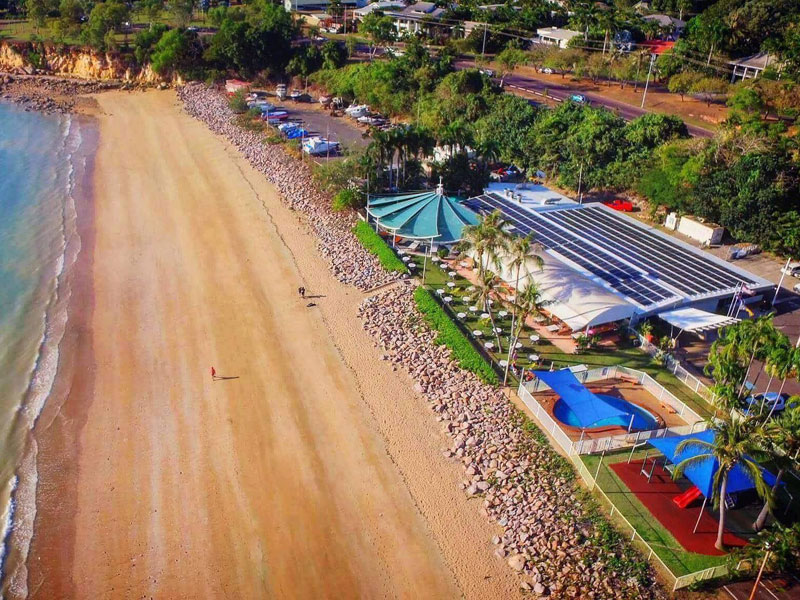The Northern Territory (NT) Government has announced an Electricity Market Priority Reform Program as it looks to refashion significant parts of its electricity supply industry in order to facilitate the increased integration of renewables.
Only a few years ago, the NT Government’s target of 50% renewable energy by 2030 might’ve seemed about as farfetched a project as a ski-shop in Darwin. But in the last year alone the NT has begun to take its extraordinary potential seriously. The sunburnt state clearly realised that it had no excuse for having the lowest renewable energy production in the nation. Now, however, not only is the 2030 target beginning to look achievable, but the NT is also firmly on its way to being a global renewable energy exporter.
Sun-Spot
In what should come as a surprise to precisely nobody, the NT is transitioning to solar. Aside from the various large-scale projects in the works, the NT is projecting residential and commercial rooftop solar to supply up to 16% of electricity by the end of 2020.
However, this projected total is perhaps less than it could be. Indeed, the Government itself admits this is only a 2% rise since 2016. In April, the NT Government massively reduced its feed-in tariff paid to new rooftop generators, a move that resulted in an instant reduction in rooftop solar installations. To help pay for its $31 million new investment in both large and small-scale battery storage, the Gunner Government reduced its FiT on new solar installations from a one-to-one tariff (currently around 24c/kWh) to a flat rate of 8.3c/kWh and instantly almost doubled the payback period on a 6.6 kW system — payback will of course be longer still on the PV-plus-battery systems the new scheme is designed to incentivise.
Whether the NT really needed to prioritise between these two renewable trajectories is yet to be known. Nevertheless, the 12 June announcement of the Electricity Market Priority Reform highlights four main ambitions for the market going forward in the transition to solar:
- improve coordination of solar and gas-fired generators (dispatch)
- ensure there is sufficient generation capacity available to meet consumers’ needs (reliability)
- facilitate payments between retailers and generators (settlement)
- improve the efficiency of the provision of essential power system security services. (system services)
NT Minister for Renewables, Energy and Essential Services, Dale Wakefield, said, “These market reforms will encourage private investment in the new and innovative technology that will allow more renewables in our electricity system while ensuring reliable and secure power.”
According to the Introductory Notes of the Reform Program, the current I-NTEM, especially regarding reliability, dispatch, is basically a bare minimum system. The Reform Program will seek to introduce a reliability standard to ensure the balance of generational capacity as more diverse actors enter the market.
As regards dispatch, it has already been identified that efficiency in dispatch could be improved through using the most up-to-date information, which is to say, a generators’ information on the day, rather than the day before, which is how the current system operates. As significantly more large-scale solar PV generators enter the power system this necessity of improved dispatch efficiency is even more important, as solar generation, due to its intermittency, is best estimated on the day.
Despite perhaps being too hasty with its alterations to the solar feed-in tariff, there is little argument that the NT electricity market needed reform, as it is well known to be highly unstable and unreliable.
According to the Australia PV Institute (APVI), 18.1% of NT dwellings have solar installations.
This content is protected by copyright and may not be reused. If you want to cooperate with us and would like to reuse some of our content, please contact: editors@pv-magazine.com.









1 comment
By submitting this form you agree to pv magazine using your data for the purposes of publishing your comment.
Your personal data will only be disclosed or otherwise transmitted to third parties for the purposes of spam filtering or if this is necessary for technical maintenance of the website. Any other transfer to third parties will not take place unless this is justified on the basis of applicable data protection regulations or if pv magazine is legally obliged to do so.
You may revoke this consent at any time with effect for the future, in which case your personal data will be deleted immediately. Otherwise, your data will be deleted if pv magazine has processed your request or the purpose of data storage is fulfilled.
Further information on data privacy can be found in our Data Protection Policy.